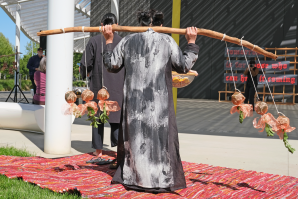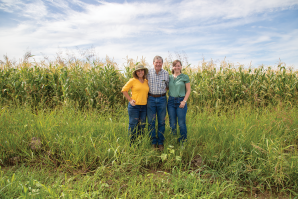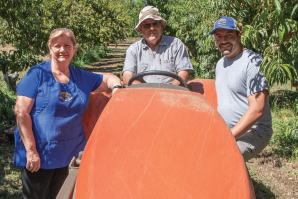When Brita Lundberg was growing up on her family’s farm in Richvale, California, her dad Bryce Lundberg would take her out to the fields and show her how to “read the rice.” Bryce was an expert at understanding the exact point when they needed to let down the water in the flooded fields, having drowned the grass weeds but not the rice plants, as rice can survive for about 24-48 hours longer than grass.
This natural method of weed control allows Lundberg Family Farms to grow their rice without pesticides, a practice Brita’s grandparents embraced as early pioneers of organic farming practices. Brita, a fourth generation rice grower, didn’t initially want to work on the farm; she loved books and studied literature in college, making her way to New York City to work in publishing.
During her time in New York, Brita’s dad would send her pictures of the farm which has been in their family since 1937 when her great-grandparents left Nebraska during the Dust Bowl and headed to California in search of land and a new life. Her dad’s photos evoked memories of the sunsets and the duck-egg hunts of her childhood and she began to think about the family members passing on, and how the fourth generation, including her two brothers and cousins, would step up.
“We were losing members of the second generation and the third generation was talking about retiring. I wondered who was going to tell the fifth generation all the stories that I loved hearing,” she says. So she applied for a job online and was hired to work in communications for Lundberg Family Farms utilizing the skills she had honed in New York.
Bryce was thrilled to have his daughter back and understood the value of storytelling for a brand as a powerful way to connect with a younger audience. “Brita is able to (leverage) her years in publishing to help us tell the mission of Lundberg Family Farms from a young woman’s perspective. Our messaging to consumers and engagement with customers elevated so much with her here,” Bryce explains.
Brita began traveling the country telling her family’s story of sustainable and regenerative farming in Northern California on Mark Bittman’s podcast and partnered with Alice Waters to host a rice-themed dinner during Climate Week in 2024.
Lundberg Family Farms is the largest organic rice grower and producer in the state of California, with operations in Richvale in Butte County. They manage around 20,000 acres in partnership with family growers and have over 8,500 acres of regenerative organic certified (ROC) fields. They sell over 70 regenerative organic certified products which are mostly sold in the U.S such as rice, rice cakes and rice crackers that are available at major retailers and online.
Bryce Lundberg, right, holds Brita as a child.

Lundberg’s third and fourth generation family members now work together, each bringing their unique skills to farming practices such as soil analysis. Bryce measures the clay-like soil that the rice plants thrive in using both modern science and intuitive knowledge, Brita explains. “My great grandpa Albert was managing soil long before we had the tests we now use for data, so we also rely on the presence of a farmer. My dad is known for using all his senses, especially smell and taste when sampling the soil,” she says.
Bryce can determine the quality of the soil by tasting a bit of it. “I don’t taste a lot of soil, but I know if it smells good it’s going to have a sweetness and complexity to it,” he says.
A commitment to the climate is a driving force at Lundberg so they utilize crop rotation in their regenerative and organic farming practices, an approach that uses less water and resources and yields fertile soil. The fields are allowed to lie fallow and take a turn as habitat for the migratory birds which traverse the Pacific Flyway, and then are planted with cover crops such as vetch, which is a nitrogen fixer that makes a nutritious cocktail when tilled under, which Bryce calls “green juice.” Lundberg is especially committed to protecting the wildlife that rely on their rice fields for habitat and preserves thousands of duck eggs every year that nest in their fields as they migrate the major north-south flyway.
Farmers Albert and Frances Lundberg left Nebraska in 1937 during the Dust Bowl to start a new life in the Sacramento Valley. Brita’s great grandparents, who were always seeking improvement out of necessity, established research and innovation as important family values.
“Great grandpa decided to come to California and could only afford the worst land, so he learned how to work with the good weeds, and in the ‘70s my grandpa Harlan began growing new varieties of rice which led to the development of our breeding program,” Brita explains. Lundberg invests about half a million dollars annually into the breeding nursery in an effort to find cultivars that will thrive in California’s Sacramento Valley while also benefiting the soil. Today, Lundberg’s rice products are sold nationwide and in Canada.
The breeding nursery, which is in its 50th year of production, recently crossed two cultivars to create a new black pearl rice, a process that took 12 years and produced a rice that is high in antioxidants and has a 24 percent higher crop yield, according to Brita. “It was developed to have impeccable taste, quality and nutrition and also have compatibility with our regenerative organic certified farming practices,” she says. This certification on food products represents the highest standards in organic agriculture — summarizing Brita’s grandparents mission to leave the land better than they found it.
Brita has gained a deeper appreciation of her grandparent’s impact having left and then returned to the farm. She safeguards their stories while she and her brothers and cousins create new ones. All Lundberg family members maintain a commitment to keeping the business within their family. “It can be a challenge and a blessing, when most family farms fall apart — usually between the third and fourth generation — or sell out, we are committed to remaining independent,” she says. “Telling my grandparent’s stories feels like a way of keeping them alive and carrying their legacy forward.”
–
Subscribe to the Comstock’s newsletter today.
Recommended For You

Beyond Fusion: Minh Phan’s Radical Hospitality Reimagines the Food Narrative
Marking 50 years since the Fall of Saigon, Phan’s performance at UC Davis transforms food into a sensory ritual of grief, healing and transcultural remembrance
At the UC Davis Manetti Shrem Museum, spring rolls, Meyer lemons and sculptural altars become vessels for stories of migration, loss and radical care.

From Baker’s Stats to Stanzas: Jim Franks’ ‘Existential Bread’ Launches in Davis
Picking apart the stuff (seeds, stories, hoaxes) that go into what we think we know about bread
Baker and poet Jim Franks launched his experimental cookbook “Existential Bread” in Davis this week in collaboration with Student Collaborative Organic Plant Breeding Education, an interdisciplinary approach that offers a new way to consider our relationship with food and the complex processes and economics behind it.

A Pioneer in Organic Farming
Family business spotlight: Pleasant Grove Farms in Sutter County grows popcorn, wheat and rice the natural way
Driving along a country road in rural Sutter County and seeing endless rows of corn, you can’t help but think of the movie “Field of Dreams.” The Sills family decided to build their dream eight decades ago. Pleasant Grove Farms, a family-owned, certified organic grain and bean farm, has been growing corn and other crops for nearly 80 years.

A Piece of the Pie
Family business spotlight: The Fruit Bowl has been providing peaches and more to Stockton for 76 years
Over the course of summer and the first weeks of fall, over 60 varieties of peaches and nectarines pass through The Fruit Bowl, a 76-year-old produce stand on the rural outskirts of Stockton.



